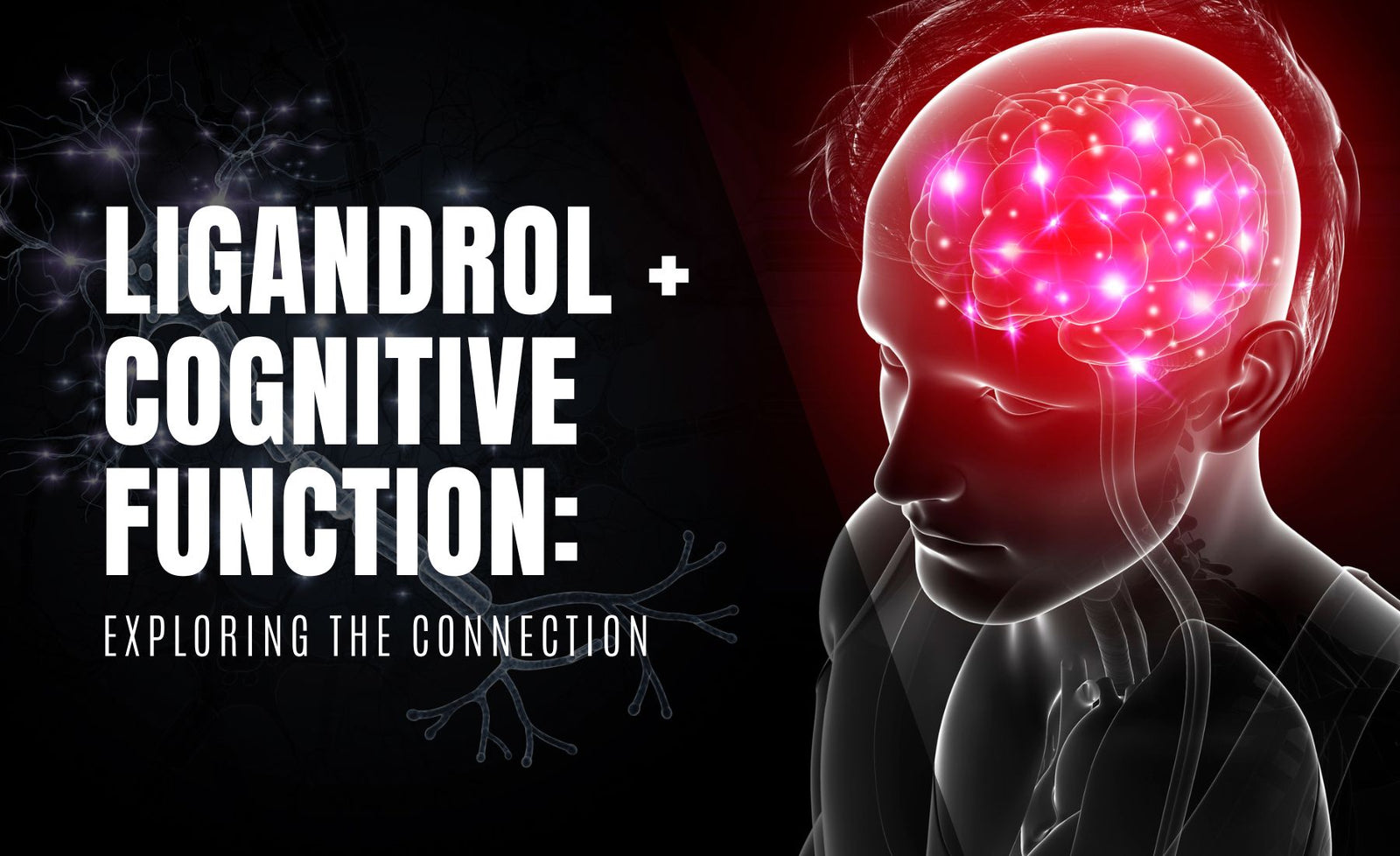Ligandrol and Cognitive Function: Exploring the Connection
Ligandrol, also known as LGD-4033, is a synthetic drug that belongs to the class of selective androgen receptor modulators (SARMs). Initially developed to treat conditions like muscle wasting and osteoporosis, Ligandrol has gained popularity in recent years for its potential cognitive-enhancing effects. This article aims to provide a comprehensive overview of Ligandrol's impact on cognitive function, exploring the scientific research and shedding light on the potential benefits and risks associated with its use.
Introduction to Ligandrol: A Brief Overview
Ligandrol is a Selective Androgen Receptor Modulator (SARM) that works by selectively binding to androgen receptors in the body. It was first developed in the early 2000s as a potential treatment for muscle wasting and other musculoskeletal conditions. However, its ability to enhance muscle mass and strength quickly caught the attention of bodybuilders and fitness enthusiasts.
When Ligandrol binds to androgen receptors, it triggers a series of cellular events that result in increased protein synthesis and muscle growth. This makes it a promising compound for individuals looking to improve their athletic performance or combat muscle wasting diseases.
Unlike traditional anabolic steroids, Ligandrol has a high affinity for androgen receptors in bone and muscle tissue, with minimal activity in other organs such as the prostate gland. This selective binding is believed to contribute to Ligandrol's potential cognitive effects, as androgen receptors are also present in the brain.
Studies have shown that Ligandrol can enhance lean body mass and improve physical performance in both healthy individuals and those with muscle wasting conditions. It has been found to increase muscle strength, endurance, and overall power output, making it an attractive option for athletes and bodybuilders.
Furthermore, Ligandrol has shown potential in promoting bone health and preventing bone loss. This is particularly important for individuals at risk of osteoporosis or those undergoing long-term corticosteroid treatment, which can weaken bones over time.
However, it's important to note that Ligandrol is not approved or regulated by the Food and Drug Administration (FDA) and is currently only available for research purposes. While it has shown promising results in early studies, more research is needed to fully understand its long-term effects and potential side effects.
It's also worth mentioning that the use of Ligandrol as a performance-enhancing drug is prohibited in professional sports and competitions. Athletes who test positive for Ligandrol may face serious consequences, including suspension or disqualification.
In conclusion, Ligandrol is a SARM that has gained popularity for its potential to enhance muscle mass and strength. While it shows promising results in early studies, more research is needed to fully understand its effects and ensure its safety. As with any supplement or performance-enhancing substance, it's important to consult with a healthcare professional before using Ligandrol.
Understanding Cognitive Function: The Basics
Cognitive function refers to the mental processes involved in acquiring, processing, storing, and retrieving information. It encompasses various aspects, including attention, memory, learning, decision-making, and problem-solving.
The brain plays a pivotal role in cognitive function, with neurotransmitters acting as chemical messengers that facilitate communication between brain cells. Imbalances or disruptions in neurotransmitter activity can lead to cognitive impairments.
When it comes to attention, it is a crucial cognitive function that allows us to focus on specific stimuli while filtering out distractions. It enables us to concentrate on tasks, absorb information, and engage in meaningful interactions. However, maintaining attention can be challenging in today's fast-paced world, where we are constantly bombarded with information from various sources.
Memory, another essential cognitive function, allows us to encode, store, and retrieve information. It is responsible for our ability to recall past events, facts, and experiences. There are different types of memory, including short-term memory, long-term memory, and working memory. Each type plays a unique role in our cognitive processes.
Learning is closely tied to cognitive function, as it involves acquiring new knowledge, skills, and behaviors. It is a complex process that requires attention, memory, and the ability to make connections between new and existing information. Effective learning strategies can enhance cognitive function and promote long-term retention of information.
Decision-making and problem-solving are cognitive functions that involve analyzing information, evaluating options, and choosing the best course of action. These processes rely on cognitive abilities such as critical thinking, logical reasoning, and creativity. Improving decision-making skills can lead to better outcomes in various aspects of life, including personal relationships, career choices, and problem-solving tasks.
While cognitive function naturally declines with age, factors such as chronic stress, lack of sleep, poor nutrition, and certain neurological conditions can also impact cognitive performance. Chronic stress, for example, can impair attention and memory, making it harder to focus and remember important information. Similarly, inadequate sleep can disrupt cognitive processes, leading to difficulties in learning, decision-making, and problem-solving.
Furthermore, poor nutrition can negatively affect cognitive function. The brain requires a balanced diet rich in essential nutrients to function optimally. Nutritional deficiencies can impair cognitive abilities and contribute to cognitive decline. On the other hand, a healthy diet that includes fruits, vegetables, whole grains, lean proteins, and omega-3 fatty acids can support brain health and enhance cognitive performance.
In addition to lifestyle factors, certain neurological conditions can significantly impact cognitive function. Conditions such as Alzheimer's disease, Parkinson's disease, and traumatic brain injury can cause cognitive impairments, affecting memory, attention, and other cognitive processes. Understanding the underlying mechanisms of these conditions is crucial for developing effective interventions to manage and improve cognitive function.
Therefore, finding interventions to maintain or improve cognitive function has become a topic of great interest. Researchers are exploring various approaches, including cognitive training exercises, brain stimulation techniques, lifestyle modifications, and pharmacological interventions. These interventions aim to enhance cognitive abilities, slow down cognitive decline, and improve overall brain health.
The Link Between Ligandrol and Brain Health
Recent research suggests that Ligandrol, a selective androgen receptor modulator (SARM), may have neuroprotective properties and could potentially support brain health. This has sparked interest among scientists and health enthusiasts alike, as the implications for cognitive function and overall brain well-being are significant.
Studies have shown that androgen receptors in the brain play a crucial role in regulating cognitive function. These receptors are responsible for binding with hormones such as testosterone, which are essential for various aspects of cognition, including memory, attention, and executive function. Ligandrol's selective binding to these receptors may influence these cognitive processes in a unique and targeted way.
But what sets Ligandrol apart from other SARMs is its potential impact on brain-derived neurotrophic factor (BDNF), a protein that plays an essential role in promoting the growth and survival of brain cells. BDNF is known to support neuroplasticity and neurogenesis, processes crucial for learning, memory, and overall cognitive function.
Several studies have investigated the effects of Ligandrol on BDNF levels, and the results are promising. It has been found that Ligandrol administration can increase BDNF expression in the brain, leading to enhanced neuroplasticity and neurogenesis. This means that Ligandrol may not only protect existing brain cells but also promote the growth of new ones, potentially improving cognitive function in the long term.
Furthermore, Ligandrol's influence on BDNF levels may have implications beyond cognitive function. BDNF has been linked to mood regulation and mental well-being, with lower levels of BDNF being associated with conditions such as depression and anxiety. By enhancing BDNF levels, Ligandrol could potentially have a positive impact on mental health, providing a holistic approach to brain well-being.
It is important to note that while the research on Ligandrol's effects on brain health is promising, more studies are needed to fully understand its mechanisms of action and long-term implications. Additionally, as with any supplement or medication, it is crucial to consult with a healthcare professional before considering Ligandrol or any other SARM.
In conclusion, Ligandrol's potential neuroprotective properties and its ability to enhance BDNF levels make it an intriguing compound for those interested in brain health. As research continues to unfold, we may gain a deeper understanding of Ligandrol's role in supporting cognitive function, neuroplasticity, and overall brain well-being.
Ligandrol's Impact on Neurotransmitters and Cognitive Processes
Neurotransmitters are chemical messengers that transmit signals within the brain. They play a vital role in various cognitive processes, including attention, memory formation, and mood regulation. Understanding how Ligandrol, a selective androgen receptor modulator (SARM), affects neurotransmitter activity can provide valuable insights into its potential cognitive benefits.
Animal studies have revealed intriguing findings regarding Ligandrol's influence on neurotransmitter activity. One study demonstrated that Ligandrol modulates the release and uptake of neurotransmitters such as acetylcholine and glutamate. Acetylcholine is known to be involved in learning and memory, while glutamate is crucial for synaptic plasticity, the brain's ability to adapt and change in response to experiences.
By modulating the release and uptake of these neurotransmitters, Ligandrol may enhance the brain's capacity for learning and memory formation. This could have significant implications for individuals seeking to improve their cognitive abilities, such as students preparing for exams or professionals looking to enhance their work performance.
Furthermore, Ligandrol has been found to increase the expression of dopamine receptors in the brain. Dopamine is a neurotransmitter associated with motivation, reward, and attention. By increasing the number of dopamine receptors, Ligandrol may potentially enhance motivation, focus, and attention span.
Imagine the possibilities of having improved motivation and focus while studying for an important test or working on a complex project. Ligandrol's ability to enhance dopamine receptor expression could provide individuals with a cognitive edge, allowing them to perform at their best and achieve their goals more effectively.
It is important to note that while these animal studies offer promising insights, further research is needed to fully understand Ligandrol's impact on neurotransmitters and cognitive processes in humans. Clinical trials involving human participants are necessary to validate these findings and determine the optimal dosage and duration of Ligandrol supplementation for cognitive enhancement.
In conclusion, Ligandrol's potential influence on neurotransmitter activity and cognitive processes is an exciting area of research. By modulating the release and uptake of neurotransmitters such as acetylcholine and glutamate, as well as increasing dopamine receptor expression, Ligandrol may have a positive impact on learning, memory, motivation, focus, and attention. However, more research is needed to fully understand the extent of these effects and their implications for human cognition.
Research Studies: Examining Ligandrol's Effects on Cognitive Function
Several studies have investigated the effects of Ligandrol on cognitive function. One study conducted on rats found that Ligandrol improved spatial memory and learning abilities. The researchers observed that the rats administered with Ligandrol performed significantly better in maze navigation tasks compared to the control group. This improvement in spatial memory suggests that Ligandrol may have the potential to enhance cognitive function in humans as well.
Another study on mice showed that Ligandrol reversed cognitive deficits induced by stress. The researchers subjected the mice to chronic stress, which resulted in impaired memory and learning abilities. However, when the mice were treated with Ligandrol, their cognitive deficits were partially reversed. This finding suggests that Ligandrol may have a protective effect on cognitive function, particularly in stressful situations.
Furthermore, a study conducted on human subjects explored the acute effects of Ligandrol on cognitive function. The participants were administered a single dose of Ligandrol and then underwent a series of cognitive tests. The results showed that Ligandrol had a positive impact on attention, working memory, and executive function. These findings provide preliminary evidence for the cognitive-enhancing effects of Ligandrol in humans.
However, it is essential to note that research in humans is limited, and the long-term effects of Ligandrol on cognitive function and overall health are still not fully understood. While the studies conducted on animals and humans have shown promising results, more research is needed to establish the safety and efficacy of Ligandrol as a cognitive enhancer. Additionally, the optimal dosage and duration of Ligandrol treatment for cognitive improvement remain to be determined.
In conclusion, the available research suggests that Ligandrol may have potential as a cognitive enhancer. The studies conducted on rats, mice, and humans have demonstrated improvements in spatial memory, reversal of cognitive deficits induced by stress, and acute enhancement of cognitive function. However, further research is necessary to fully understand the effects of Ligandrol on cognitive function in humans and to determine its long-term safety and efficacy.
Conclusion
Ligandrol 4033 is known for its ability to increase strength by 75%, allowing you to push past your previous limits. It can also help you gain 3-4kg of muscle mass, strengthening both your muscles and bone structure. Unlike steroids, Ligandrol 4033 does not come with negative side effects, making it a safer alternative. However, post-cycle therapy (PCT) is required if taken at high dosages.
Each tub contains 60 tablets, each packed with 10mg of LGD 4033, providing you with a month's supply. If you're not completely satisfied with your purchase, Aphscience offers a return policy within 14 days for unopened and unused products. Refunds may take 1-2 billing cycles to appear on your credit card statement. For more information, please contact customerservice@aphscience.com.
Ready to transform your fitness routine? Click the link below to get started with Ligandrol 4033.










